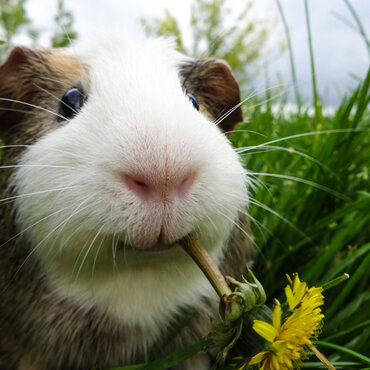Franklin Vets
Franklin Vets - excellence in veterinary care for dairy, farming, lifestyle, equine and household pets. BESTPRACTICE ACCREDITED NZ.

It’s a popular myth that you can happily keep guinea pigs and rabbits together. Not only will rabbits bully guinea pigs, they have very different needs.
While they enjoy human affection, guinea pigs need to be with others of their own kind and should always be kept in pairs or small groups. They communicate using several noises, including the well-known ‘wheek-wheek’ call – a sign of excitement or to find a friend – and a low ‘purring’ sound, which they make when they are feeling content and chilled out. They also emit a series of short ‘putt-putt’ noises when they are exploring.
Guinea pigs scent mark by rubbing their chin or cheeks across things, which helps keep their home smelling familiar and reassuring. This is why it’s important to make sure that you transfer some of the old bedding back into their accommodation when cleaning. They also drag their bottoms across the ground to leave scent secretions as messages, which are only understood by other guinea pigs.
Although crepuscular creatures, who are most active during dusk and dawn, guinea pigs are awake for up to 20 hours of the day. This means they need constant access to food, water, companion guinea pigs, safe hiding places and toys to keep them occupied, as well as an exercise area with tubes to tunnel along, shelters to hide in and deep areas of hay to forage in and nibble on.
Guinea pigs have four toes on their front feet, but only three on their back ones. While this may be good for tunnelling and burrowing, it means they are not very agile and are very poor climbers who will only manage to scale low-pitched ramps. They are, however, very inquisitive, so make sure there are no hazards within their environment that will cause curious cavies to injure themselves.
Baby guinea pigs, known as pups, are born with fur and their eyes open and are able to run when only a few hours old – something that comes in very handy for a prey species. At three weeks, babies are weaned, and they are fully mature in three months, although they will keep growing in size until they are around a year old.
Just like humans, guinea pigs are not able to make or store Vitamin C. Feeding good quality, grass-based guinea pig pellets (we recommend Burgess), which are high in fibre and Vitamin C and rich in nutrients, is the best way to ensure they’re getting everything they need, along with a small handful of leafy greens, such as dandelion, spinach, kale and broccoli. Avoid ‘muesli’-style food as these have been shown to cause digestive problems and dental disease.
Good quality feeding hay should be the main part of a guinea pig’s diet. As mini grazers, not only does this help their digestive system to work properly, gnawing on hay keeps their constantly-growing teeth the right length. Gnaw sticks can be an additional tasty treat to help keep guinea pig teeth in good shape.
With the right nutrition, suitable accommodation, company, care and kindness, guinea pigs can live for up to seven years.
Sources: rspca.org.uk, pets4homes.co.uk, guineapigsclub.com, britannica.com, livescience.com, Burgess.